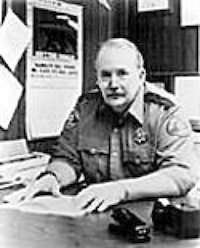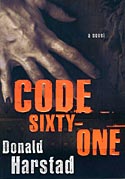Iowa author draws on experience in mysteries
Ex-investigator Harstad to speak at library
By Jody Ewing
September 19, 2002
 Donald Harstad
Donald Harstad
The Details
What: An Evening with Iowa Author Donald Harstad, author of Eleven Days, Known Dead, The Big Thaw and Code Sixty-One
Where: The Wilbur Aalfs (Main) Library
When: Thursday, Sept. 26, 7 p.m.
For More Info: Call 712-255-2933
Victims always have fascinated Iowa mystery writer Donald Harstad. During his 26 years as a deputy sheriff and eventually Chief Investigator, he had ample opportunity to examine why the little things often seal one’s fate.
“Most of the time, a victim, wittingly or unwittingly, has participated in their own death,” said the author from his home in Elkader, Iowa. “In some way, they have done something that if they had a moment to stop and think, or if they had two or three years to reflect, they would not have done what put them where they are now.”
The retired deputy sheriff has drawn on those years of law enforcement experience to create a series of regional mysteries that not only explain why cops do what they do, but examine how people get themselves into deadly situations. His latest novel “Code Sixty-One,” brings back deputy sheriff hero Carl Houseman who faces his biggest case yet hunting a suspected vampire.
Harstad will discuss his fourth police procedural novel as well as his other books during an evening visit on Sept. 26 at the Sioux City Public Library.
The premise for the book began by asking the same questions an investigator would ask. “I thought, how would we really do a guy who was delusional enough to believe he was a vampire?” says Harstad. “How would we do an investigation like that?”
With that idea in mind, Harstad went looking for the novel’s perfect setting. He found it after touring a spectacular MacGregor, Iowa, mansion. “Code Sixty-One” unfolds on a bluff overlooking the Mississippi River when a body drained of blood is reported in a rural mansion.

“It’s all characters, and when you’re a cop, you get to meet so many of them and under very interesting circumstances,” says Harstad, who wrote his first novel “Eleven Days: A Novel of the Heartland,” in 11 days. He strives to keep things authentic and procedures believable while helping readers understand how cops think.
“People don’t know why cops do what they do,” Harstad says, “and it’s as much the fault of the police as anybody else because we just don’t talk about these things.”
One of those things involves the background of the victim. Cops sometimes don’t want to get into that, says Harstad, because they begin to start sympathizing with them too much or not sympathizing with them, both which affect the way they look at a case. As a full-time novelist, Harstad now explores how the cumulative effect of bad choices can often signal the victim’s end.
Despite the serious crimes committed in the novels, detective Carl Houseman — middle-aged and bald — uses wry humor and speaks to the reader in a droll, natural voice. Harstad uses that wit to offset the difference between rural police and those in metropolitan areas. In his next book “The Heartland Experiment,” he cites an FBI counter-terrorism official talking to hero Carl.
“He says, ‘Ok, what do you guys have for night vision equipment?’ and Carl looks him right in the eye and says ‘eight flashlights.’ And that’s just about the way it goes.”
This article first appeared in the Weekender on September 19, 2002.
Copyright © Jody Ewing
Hello,
Thank you for the interview, is there a follow up?
I am looking for a copy of your book Code 61 and November Raibn. Any idea where I can buy them
Kathy, both books are available on Amazon.com. Thanks for your comment!
donald harstad is a gem! his wry and descriptive novels have so much authenticity in the details. His description of the lengthy process of suiting up for a late night callout is something I chuckle about every time I make ready for a patrol shift. He actually talks about the necessary, tedious details like writing reports and obtaining warrants. I cannot claim to have beached a casino boat or exchanged repartee with a paramilitary chieftain–but if I have to in the remaining months of a long career, I have a model to follow. Keep writing , Mr. Harstad!